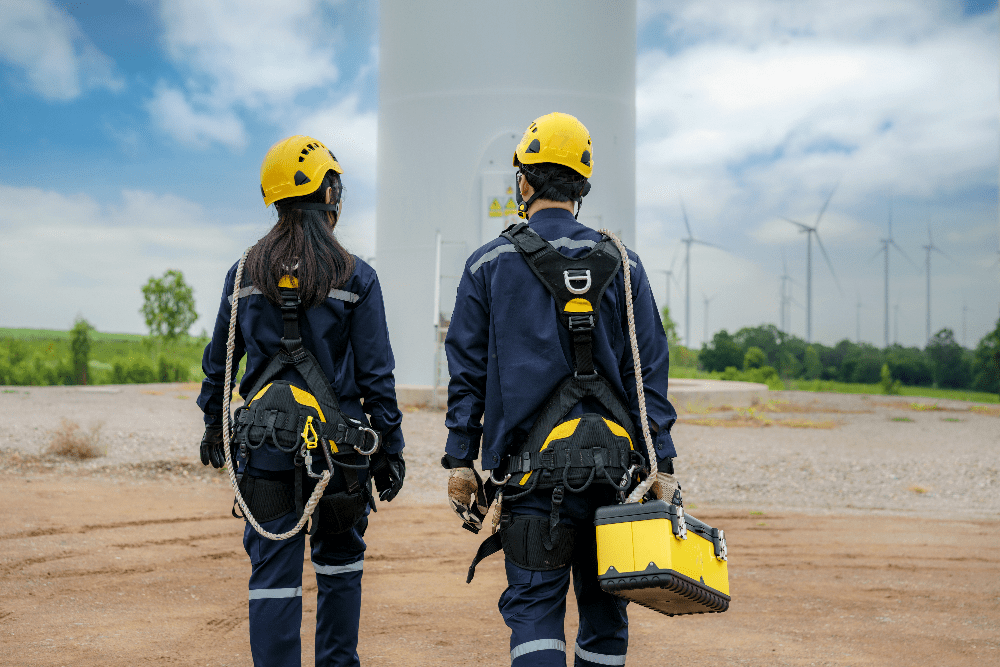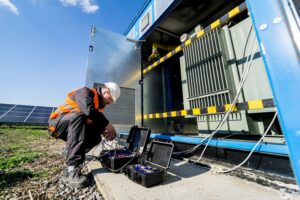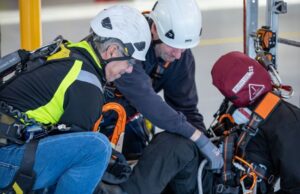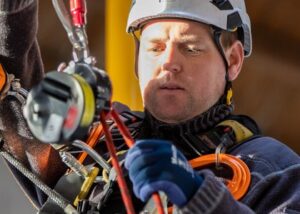Full service training - why developing the ongoing skills and competency of wind technicians is vital to protect the future of wind energy.
Full service training for wind technicians is a comprehensive educational program that equips individuals with the necessary knowledge, skills, and safety practices to perform a wide range of tasks related to the operation, maintenance, and repair of wind turbines. This type of training prepares technicians for the diverse challenges they will encounter while working in the wind energy sector, covering both technical and safety aspects.
Wind technicians face a wide range of challenges, from electrical hazards to mechanical malfunctions, often while working at significant heights and in remote areas. Full service training ensures that technicians are not only equipped to handle these technical tasks but also to do so safely, reducing the risk of accidents and improving the reliability of wind turbines.
Full service training typically includes certifications like the Global Wind Organisation (GWO) training modules, which are globally recognized and essential for working in the wind energy industry. These certifications ensure technicians have a standard level of competence in safety and technical skills.
Key Components of Full Service Training for Wind Technicians
Electrical Systems Training:
- Understanding the electrical components of wind turbines, including generators, converters, inverters, and transformers.
- Training in troubleshooting, repair, and maintenance of both low and high-voltage systems.
- Arc flash, shock protection, and lockout/tagout (LOTO) procedures for electrical safety.
Mechanical Systems Training:
- Instruction on the mechanical elements of turbines, such as gearboxes, yaw systems, and hydraulic systems.
- Skills in lubrication, component replacement, and mechanical troubleshooting.
- Vibration analysis and other diagnostic techniques to identify potential mechanical issues.
Hydraulic and Pneumatic Systems:
- Understanding the hydraulic systems used for braking, pitch control, and other turbine functions.
- Training in fluid power systems, hydraulic pumps, and actuators.
Turbine Operations and Control Systems:
- Training in turbine control software, Supervisory Control and Data Acquisition (SCADA) systems, and performance monitoring.
- Instruction on operational parameters, troubleshooting control systems, and remote monitoring techniques.
Safety Training:
- In-depth training on working at heights, confined spaces, and emergency rescue techniques.
- GWO (Global Wind Organisation) certifications in first aid, manual handling, fire awareness, and working at heights.
- Electrical safety (NFPA 70E and GWO CoHE standards), personal protective equipment (PPE), and fall protection systems.
Climbing and Rescue Techniques:
- Training in how to safely climb wind turbines, including the use of fall arrest systems and ladders.
- Emergency evacuation and rescue procedures, including self-rescue and assisting injured colleagues from height.
Preventive Maintenance:
- Routine maintenance tasks such as inspecting and testing equipment, cleaning turbine components, and tightening bolts.
- Understanding predictive maintenance techniques, like thermography and oil analysis, to prevent failures.
Environmental and Site-Specific Training:
- Training in environmental regulations and the impacts of wind farm operations.
- Site-specific skills, including working in offshore wind farms, remote locations, and harsh weather conditions.
Ongoing skills development is essential for wind technicians to keep pace with the evolving technologies and challenges of the wind energy industry. From technical expertise in electrical and mechanical systems to advanced safety practices, leadership, and environmental compliance, continuous learning makes technicians more effective, safer, and better prepared to handle the complexities of modern wind turbine maintenance.
Advanced Electrical and Mechanical Expertise
- Electrical Systems: Wind turbines are becoming more technologically advanced, with more sophisticated electrical components and control systems. Continuing education in advanced electrical troubleshooting, high-voltage safety, and diagnostics is essential for improving technical capabilities.
- Mechanical Systems: Technicians should continually improve their understanding of turbine mechanics, including gearboxes, yaw, and pitch systems. Advanced training in vibration analysis, lubrication techniques, and failure prediction will help them better maintain and repair turbines.
Control Systems and SCADA
- SCADA (Supervisory Control and Data Acquisition) Systems: Wind farms use SCADA to monitor turbine performance and diagnose issues remotely. Learning to interpret data, troubleshoot control systems, and optimize turbine operations through SCADA will enhance efficiency and reduce downtime.
- Automation and Software Updates: As turbines become more automated, technicians should stay updated on new software and control algorithms. This ensures they can operate and troubleshoot the latest turbine models effectively.
Predictive and Preventive Maintenance Techniques
- Predictive Maintenance: Understanding and using predictive maintenance tools such as thermography, oil analysis, and vibration monitoring helps technicians identify potential problems before they cause failures. Developing these skills enables better planning and reduces costly turbine downtime.
- Preventive Maintenance Practices: Technicians should regularly improve their ability to perform routine checks, tighten components, and clean equipment. Familiarity with new preventive maintenance tools and techniques will boost operational reliability.
GWO Certifications and Safety Practices
- Advanced Safety Training: GWO (Global Wind Organisation) provides various safety certifications, such as working at heights, first aid, and fire safety. Staying current with certifications and pursuing higher-level courses in rescue techniques, confined space entry, and offshore safety will ensure technicians are fully prepared for emergencies.
- Electrical Safety (NFPA 70E and GWO CoHE): Expanding knowledge of electrical safety standards and hazardous energy control will further reduce risks related to high-voltage work and enhance technicians’ ability to protect themselves and their team.
Working at Heights and Rescue Techniques
- Climbing Proficiency: Ongoing practice with climbing techniques, fall protection systems, and emergency rescue scenarios ensures technicians can work confidently at height. This also includes learning self-rescue and team rescue skills.
- Advanced Rescue Techniques: Specialized rescue training for difficult conditions, such as offshore environments or extreme weather, helps improve the technician’s response to emergencies and difficult rescue scenarios.
Technology and Renewable Energy Innovations
- Wind Energy Technology Advancements: The wind energy industry is rapidly evolving, with new turbine designs, materials, and operational systems. Wind technicians must keep learning about these innovations to maintain the latest models and apply modern maintenance strategies.
- Digitalization and Data Analytics: As the wind sector embraces data-driven operations, technicians with skills in data analytics can better interpret turbine performance metrics, predict failures, and improve energy output. Courses in data management and analytics would be valuable.
Leadership and Communication Skills
- Team Leadership: As technicians gain experience, they may take on leadership roles within maintenance teams. Developing leadership skills like team management, task coordination, and decision-making can improve overall team performance.
- Communication Skills: Effective communication, both with team members and remote operations centers, is crucial for coordinating maintenance activities and ensuring safe operations. Technicians should develop clear and precise communication skills, especially in emergency situations.
Cross-Specialization
- Multi-Disciplinary Knowledge: Technicians can become more valuable by gaining skills across multiple technical areas. For example, gaining expertise in hydraulic and pneumatic systems in addition to electrical and mechanical knowledge enables them to work on different parts of the turbine more effectively.
- Offshore Wind Training: For technicians interested in offshore wind energy, gaining specialized training for offshore turbines, boat transfers, and working in marine environments adds a significant skill set to their repertoire.
Environmental Awareness and Compliance
- Environmental Regulations and Sustainability: As environmental regulations tighten, technicians need to understand compliance issues related to waste disposal, oil spills, and noise reduction. Learning best practices for sustainability ensures operations adhere to regulations while minimizing the environmental impact of wind farms.
Technician Well-Being and Physical Fitness
- Physical Conditioning: The physical demands of climbing and working in challenging environments require technicians to maintain strong physical health. Ongoing fitness training and understanding ergonomics are essential for long-term career sustainability.
- Mental Health and Stress Management: Technicians often work in isolated or stressful environments. Awareness of mental health practices and techniques for managing stress can help them stay focused, perform well under pressure, and maintain overall well-being.
Book electrical safety training
Interested in world-class electrical safety training for working on wind turbines? Click the button to find out more and book.




